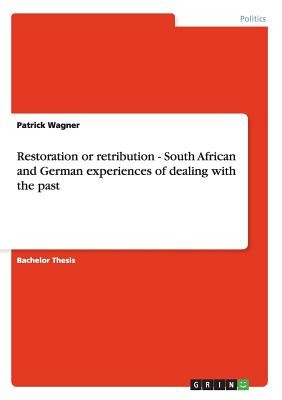
- We will send in 10–14 business days.
- Author: Patrick Wagner
- Publisher: GRIN Verlag
- Year: 2007
- Pages: 58
- ISBN-10: 3638700259
- ISBN-13: 9783638700252
- Format: 14.8 x 21 x 0.4 cm, softcover
- Language: English
- SAVE -10% with code: EXTRA
Restoration or retribution - South African and German experiences of dealing with the past (e-book) (used book) | bookbook.eu
Reviews
Description
Bachelor Thesis from the year 2003 in the subject Politics - Other International Politics Topics, grade: 1 (A), University of Kent (Department of Politics and International Relations), language: English, abstract: Numerous societies who are in a transition period between an authoritarian regime and democracy face the question of how to deal with their past. In most cases the option to forget what has happened and to concentrate only on the future is neither possible nor desired by the people. For many the choice is between setting up a truth commission and dealing with the perpetrators of gross human rights violations in special or conventional courts. Before discussing the South African and the German examples, part one of this paper examines the different concepts of justice proposed by the two mechanisms of dealing with the past. Part two then focuses on the South African experience to deal with the atrocities of the apartheid regime by means of the Truth and Reconciliation Commission. The commission's approach on how to deal with the past will be discussed alongside both its achievements and shortcomings. The controversial debate about the TRC's policy to grant amnesty for perpetrators of gross human rights violations in return for the truth shall be a central feature of this part. The German experience and the International Military Tribunal (IMT) at Nuremberg are the topics of part three. One of the most important achievements of the IMT certainly was its impact on international law. For the first time in history, although this was not the primary aim of the tribunal, 'crimes against humanity' were part of the allegations against the defendants. On the other hand, the IMT was criticized heavily for constituting victors' justice and therefore its judgement was argued to be illegitimately imposed. Finally, part four compares the two mechanisms, truth commissions and trials or military tribunals, and seeks to point out their advantages and disadvantages. Clearly,
EXTRA 10 % discount with code: EXTRA
The promotion ends in 17d.22:45:39
The discount code is valid when purchasing from 10 €. Discounts do not stack.
- Author: Patrick Wagner
- Publisher: GRIN Verlag
- Year: 2007
- Pages: 58
- ISBN-10: 3638700259
- ISBN-13: 9783638700252
- Format: 14.8 x 21 x 0.4 cm, softcover
- Language: English English
Bachelor Thesis from the year 2003 in the subject Politics - Other International Politics Topics, grade: 1 (A), University of Kent (Department of Politics and International Relations), language: English, abstract: Numerous societies who are in a transition period between an authoritarian regime and democracy face the question of how to deal with their past. In most cases the option to forget what has happened and to concentrate only on the future is neither possible nor desired by the people. For many the choice is between setting up a truth commission and dealing with the perpetrators of gross human rights violations in special or conventional courts. Before discussing the South African and the German examples, part one of this paper examines the different concepts of justice proposed by the two mechanisms of dealing with the past. Part two then focuses on the South African experience to deal with the atrocities of the apartheid regime by means of the Truth and Reconciliation Commission. The commission's approach on how to deal with the past will be discussed alongside both its achievements and shortcomings. The controversial debate about the TRC's policy to grant amnesty for perpetrators of gross human rights violations in return for the truth shall be a central feature of this part. The German experience and the International Military Tribunal (IMT) at Nuremberg are the topics of part three. One of the most important achievements of the IMT certainly was its impact on international law. For the first time in history, although this was not the primary aim of the tribunal, 'crimes against humanity' were part of the allegations against the defendants. On the other hand, the IMT was criticized heavily for constituting victors' justice and therefore its judgement was argued to be illegitimately imposed. Finally, part four compares the two mechanisms, truth commissions and trials or military tribunals, and seeks to point out their advantages and disadvantages. Clearly,


Reviews